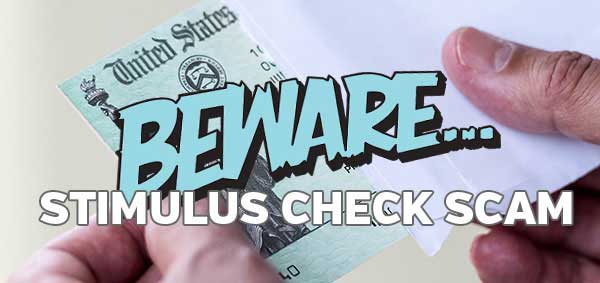Scammers are already using this opportunity to steal the money coming your way or your identity by getting access to your personal information. Keep in mind, no one has early access to these funds!

Beware of the following stimulus check scams:
- Fake Stimulus Checks. There are fake checks circulating right now. It will take at least three weeks for direct deposits and up to 10 weeks for paper checks to arrive by mail. If you receive any checks now, they may be fake. Telltale signs are checks written in odd amounts or include cents, or a check that requires you to verify receipt online or by calling a number.
- Social media, phone calls, or text messages claiming to get in touch with you. Scammers are reaching out to people online on social media platforms or by sending text messages with claims they are from the IRS or other government agency and are trying to get in touch with you regarding your stimulus check. Ignore/Delete these messages. The U.S. Government will never reach out to you via any social media platform or by text.
- Scammers pose as a government agency and will send a link to a website or something similar for you to verify personal information. The government does not do this. The government already has the information they need and will not reach out to you for verification of your social security number or other personal identification.
- Processing Fee. Scammers pose as the IRS or other government agency claiming you can receive your stimulus check faster if you pay a processing fee. There is no way to speed up the IRS payment process.
- The IRS will never call or email you to verify any personal information. This includes your social security number, bank account number, or anything that allows access to your identity. As soon as you receive a call or email saying they are from the IRS or U.S. Treasury, hang up or delete it. These scammers are professional criminals and will use a variety of methods to steal your personal identification and your money.
Stay diligent and get your resources from trusted sources. The Federal Trade Commission (FTC) website is a good place to start to get your information about COVID-19 scams.






